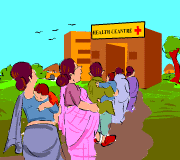
Basic Health Care [Illustration by Shinod A.P.]
Health for all means that health is to be brought within the reach of everyone in a given community. It implies the removal of obstacles to health, such as malnutrition, ignorance, diseases, contaminated water supply, unhygienic housing etc. It depends on continued progress in medicine and public health.
Primary health care
Primary health care is a new approach which integrates at the community level all the factors required to improve the health status of the population. This care is provided by the primary health centres and sub-centres with the help of community participation. This level of care is closest to people and a majority of prevailing health complaints can be satisfactorily dealt with at this level.
The aim of primary health care are as follows:
- Education about prevailing health problems and methods of prevention and control.
- Promotion of food supply and proper nutrition.
- An adequate supply of safe water and basic sanitation.
- Maternal and child health care, including family planning.
- Immunisation against infectious diseases.
- Prevention and control of endemic diseases.
- Provision of essential drugs.
Health for all does not mean that nobody will be sick or disabled, but there will be special efforts for an even distribution among the population of whatever resources for health are available for better utilisation.










